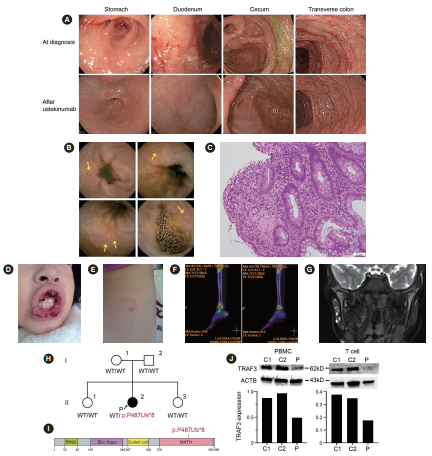2025-04-10 国立成育医療研究センター
<関連情報>
- https://www.ncchd.go.jp/press/2025/0410.html
- https://www.ncchd.go.jp/press/2025/0410.pdf
- https://irjournal.org/journal/view.php?doi=10.5217/ir.2024.00190
ウステキヌマブに反応する新規de novo TRAF3フレームシフト変異体を有する若年女性患者における炎症性腸疾患:症例報告 Inflammatory bowel disease in a young female patient with a novel de novo TRAF3 frameshift variant responsive to ustekinumab: a case report
Ichiro Takeuchi, Kosuke Taniguchi, Katsuhiro Arai, Toru Uchiyama, Miho Terao, Asuka Hori, Toshinao Kawai, Takako Yoshioka, Reiko Kyodo, Hirotaka Shimizu, Satoshi Fujita, Kenichiro Motomura, Yuka Okazaki, Takashi Ishikawa, Masao Ogura, Kentaro Hayash, Kenji Matsumoto, Shuji Takada, Masafumi Onodera, Hideaki Morita, Kenichiro Hata
Intestinal Research Published:April 4, 2025
DOI:https://doi.org/10.5217/ir.2024.00190

Abstract
Tumor necrosis factor receptor-associated factor 3 (TRAF3) is an anti-inflammatory molecule that negatively regulates the non-canonical nuclear factor-κB pathway. Although TRAF3 haploinsufficiency (TRAF3 HI) can influence innate and adaptive immune cells, its effect on inflammatory bowel disease (IBD) development remains unclear. Here, we report the first case of severe early-onset IBD with a novel TRAF3 variant leading to HI, successfully treated with ustekinumab. A 6-year-old girl with a recurrent parotitis, otitis media, tonsilitis, and atopic dermatitis developed IBD involving the stomach, small intestine, and colon. At diagnosis, the immunoglobulin (Ig)G and IgA levels were relatively high, and lymphocyte subsets showed increased counts of plasmablasts, class-switch recombination B cells, and circulating T-follicular helper cells. Treatment with azathioprine and infliximab failed to maintain remission marked by several relapses accompanied by erythema nodosum and arthritis; however, ustekinumab, an anti-interleukin (IL)-12/23p40 antibody, led to long-term clinical remission, normalizing the Ig level and reducing abnormal lymphocyte counts. Whole-exome sequencing revealed a novel heterozygous mutation in TRAF3 [p.(Pro487Leufs*8)], resulting in TRAF3 under-expression. Our case may highlight the contribution of TRAF3 HI to the development of IBD and provide insights into IBD pathophysiology, suggesting the involvement of the IL-12/23-T-follicular helper cell pathway affected by genetic mutations.


